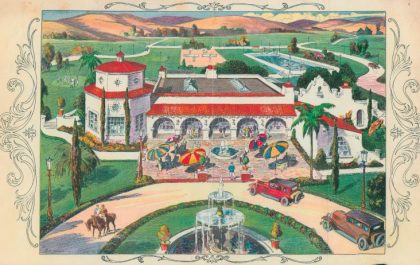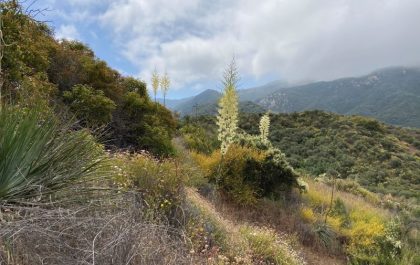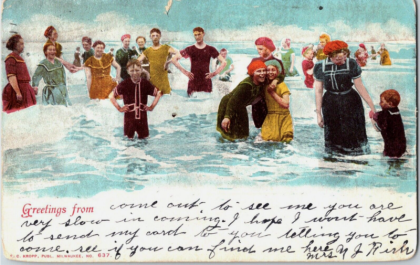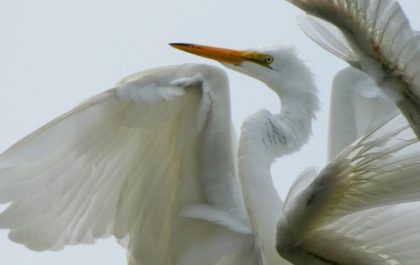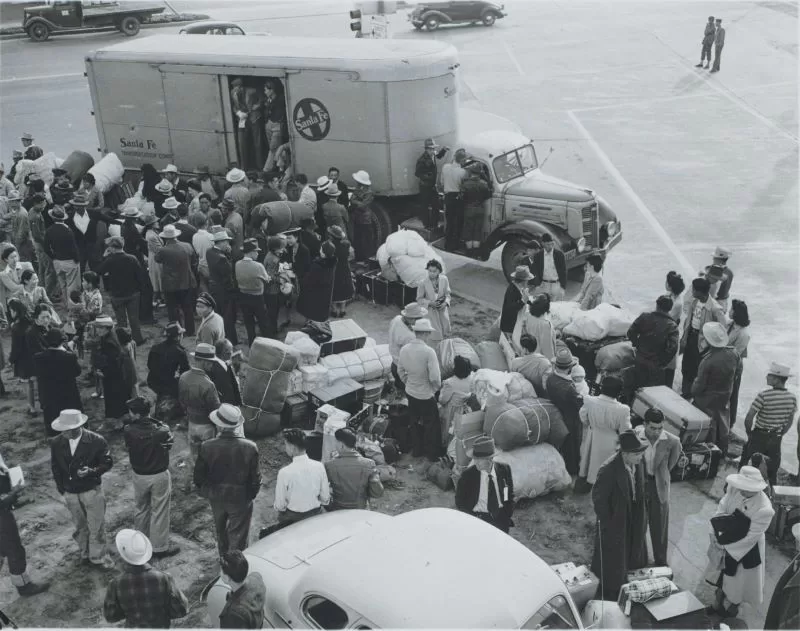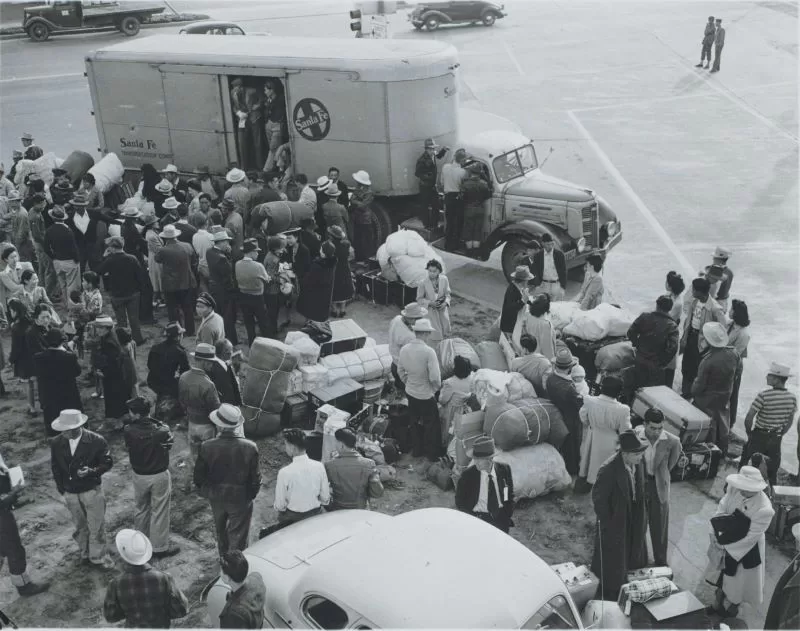
Chapter Twelve
Spring was a gentle season that year, with just enough rain to keep the streams running and the hills green. There were no dramatic storms and the temperature never dropped below the sixties.
Jessie taught Kitty and me how to paddle the old canoe that belonged to her brother. It was a slow process that resulted in our clothes getting soaked more often than not and she was an impatient teacher, but soon we were gliding smoothly through the shallow water of the lagoon. We had a bird’s eye view of egrets and terns and pelicans—the pelicans were almost as good as seeing real live pterodactyls. They were huge.
With the longer days and warmer nights we took to walking down to the beach at night to watch the coast. We got to know all of the Coast Guard men who patrolled our stretch of the shore.
We watched with fascination as a pair of tugboats towed a big sailing ship into the bay in mid April. Her name was The Prentiss, and her fate was to be used for target practice by military aircraft. We all thought that was a terrible shame.
“She would make such a good pirate ship,” Jessie lamented. “Do you think we could row out to her?”
We didn’t do it. Kitty and I were far too law-abiding to try, but three other kids had the same idea and narrowly missed being shot when the old ship was targeted by fighter planes.
Sometimes Jessie and I helped Kitty at her family’s farm, picking strawberries and weeding the rows of flowers. On one glorious day, Aunt Maddie drove all three of us all into Santa Monica. We rode the carousel and ate ice cream on the pier.
It rained the day before Easter, but Easter morning was clear and bright and warm. I went to church with Jessie and her family, not at the courthouse, but at a big church in Santa Monica. I didn’t understand much of it because the service was in Latin, but there were beautiful lilies everywhere and candles, and I liked the music. Back at home, Aunt Maddie showed me how to dye hard-boiled eggs using red and yellow onion skins. We had a kind of duel with them, smashing the points together, one side and then the other—the winner was the person whose egg didn’t crack. We ate them for lunch with strawberries from Kitty’s farm, and a kind of lovely bread pudding made by Mrs Calzada. She called it “capirotada.” It had apples and cinnamon in it. That Easter was my first major holiday away from my father and sister—but at least I received a postcard from Father, and a card from Ally. It felt strange, but on the whole it was a good day.
I didn’t really mind going back to school after the holiday. Jessie, Kitty and I were planning to print a special spring edition of The Coastwatchers that week. We were going to meet on Saturday to set the type and print the pages. Kitty was making a woodcut illustration of The Prentiss and the fighter planes for our front page. This newsletter would have six pages instead of the usual four. It was our best effort yet. I was thinking about what I had written—rewriting bits of it in my head—while I set the table for dinner on Friday evening, when Jessie rushed in.
“You have to do something!” She announced breathlessly, flinging herself at Aunt Maddie. She was out of breath. Her words came in gasps. I stared at her in consternation. I’d never seen Jessie so close to tears.
“Slow down, Jessie,” Aunt Maddie said. “Here, sit down and catch your breath. James, give her something to drink.”
Jessie waved away the glass of water I brought her.
“We don’t have time,” Jessie gasped. “We have to go now!”
“Go where?” Aunt Maddie asked, steadying her and guiding her to a chair.
“Kitty’s family were told to pack up and leave, and the sheriff is there, going through all of their things,” Jessie told her. “I think they’re maybe going to arrest Kitty’s father, and he hasn’t done anything wrong. He just grows strawberries and flowers. Captain Ryan said he’d arrest me if I didn’t go home and stop pestering him. I did go home, but my dad said there wasn’t anything we could do, so I came here.”
“Give me a minute,” Aunt Maddie said. She went into her study. I could hear her talking on the phone, but I couldn’t hear what she said. She emerged with an enigmatic expression a few moments later and began pulling on her coat. I noticed it had her silver brooch pinned to the lapel, the one shaped like a fierce little animal with bright diamond eyes
“Jessie, I want you to go home,” she said, firmly. “Your dad won’t be happy if you get arrested. James will give you a full report later. Don’t argue. James, put this in your pocket, come with me and keep your mouth shut.” She handed me a battered old booklet with a plain brown cover, but I didn’t have a chance to look at it. “Let’s go,” she ordered, shepherding us both out of the house.
My sister Ally always described our father as an Olympian. She meant he was stern and dignified like one of the Greek gods. Aunt Maddie was only a little taller than I was, but she had a kind of determination about her that was every bit as Olympian as my father, Athena in a gray coat and round glasses.
I turned my thoughts to Kitty and her family and felt a sudden wave of anxiety. We all knew there was talk about moving Japanese Americians away from the coast. President Roosevelt signed an executive order about it back in February, but then nothing happened, and anyway, it didn’t seem like it could affect people like Kitty’s family. They were all American citizens, the same as anyone.
Aunt Maddie and I roared up to the farm in Ponselle, the car’s loud engine gave everyone advance notice of our arrival. She got out of the car and walked right up to where the sheriff’s captain was talking to Mr Nakamura. I followed her, hesitantly. The dooryard was a mess. It looked like everything the family owned had been turned out and searched.
Mrs Nakamura and her children stood by helplessly, while the sheriff’s deputies poked through their possessions. Kitty held her dog Yuki in her arms. All of her art supplies, her beautiful drawings, and the pieces of wood she used to engrave the printing plates for our newsletter were strewn on the ground. Her face was drawn and I knew she was trying with all her might not to cry. I turned back to my aunt. She was greeting the men as politely as if this was an ordinary social call.
“Not here to buy strawberries, Captain Ryan?” she said.
“You should leave, ma’am,” he said, looming above her. He was a big man and he towered over my aunt and Mr Nakamura.
“And you’re not here to help these good people pack their suitcases,” Aunt Maddie continued in a pleasant voice. “That’s why my nephew and I are here. Mr Nakamura, it occurred to me you may need a place to safely store some of your family’s things while you are away. James and I would be glad to offer a room in our home, where your things will be safe.”
“Ma’am, I need you to leave,” the sheriff’s captain said. “There is a police investigation underway, and you are obstructing justice.”
“Justice? Do you have a warrant?” Aunt Maddie asked.
“He wouldn’t show us his warrant,” Mr Nakamura said. “I asked.”
“I don’t need one,” the captain replied. “We’re at war with Japan.”
“Mr Nakamura, you are an American-born citizen, aren’t you?” Aunt Maddie said gently.
He nodded. “Yes. Third generation.”
She turned to me. “James, can I borrow your book for a moment?”
“I pulled the booklet she had given me out of my pocket and handed it to her.
“This is the Constitution of the United States, Captain Ryan,” she said, handing him the booklet. “James is just starting to learn about it, but I’m sure you’re familiar with it. This is the part about due process. If you don’t have a warrant, you are violating this gentleman’s constitutional rights, the ones right here in black and white.”
Captain Ryan shifted uncomfortably from one foot to the other, but he didn’t say anything.
“Captain, You once told me your wife was from the same part of Ireland your parents came from, Atrum, I think it was,” Aunt Maddie said, gently. “And my father was born in a Welsh coal mining town. He came here for a better life. That’s why your parents and your wife came, too, isn’t it? And Mr Nakamura’s family came for the same reason, only his family was here before either of ours. Imagine if we were at war with Britain instead of Japan, I like to think we would all be loyal to America, not the empire our ancestors left behind, not even if we still cherish family recipes, or great granny’s teapot. Don’t you think so? Why is this any different?”
“Captain, let my family pack our bags in peace,” Mr Nakamura said, with quiet dignity. “There is nothing to find here except strawberries and flowers, and those won’t be here for long either with no one to tend them.”
Captain Ryan grumbled a bit but he and his deputies left.
“How did you know he didn’t have a warrant?” Mr Nakamura asked Aunt Maddie.
She gave him a wry smile. “I took the precaution of calling the judge’s home, and his wife told me that he was at a conference and wouldn’t be back until Sunday evening.” She sighed. “I’ve read troubling accounts about how due process and constitutional protections against search and seizure are being suspended or ignored because of the war, but as far as I know those issues haven’t faced a legal challenge—that’s the real test for whether something is constitutional, so I thought it was worth a try. I don’t know what that silly man thought he was going to find. All he did was make things more difficult for you. I’m sorry, Mr. Nakamura.”
“I’m sorry, too,” I whispered. I knew how hard Mr Nakamura worked on the farm, how kind he had always been to Jessie and me, and how he always encouraged and supported his daughter and delighted in her artwork, but I hadn’t known how brave he was. He stood up to Captain Ryan without crumbling or losing his temper, or showing that he was afraid. I didn’t think I could have, but I didn’t have the words to say what I felt.
“Come on James,” Aunt Maddie said to me. “There isn’t much we can do, but we can help by storing some of their things. They are only allowed to take what they can carry, and I know if it was me, I would want to be reassured that the things that are important to me would be safe while I was away.”
I set to work helping gather scattered possessions, while the adults packed seven boxes of family treasures and loaded them into Ponselle.
Kitty handed me a bag full of her drawings and the woodblocks she had carved to make the illustrations for our newsletter. Then she put Yuki in my arms. “I know you will take good care of him, James,” she said, through her tears.
“I will,” I promised. “We are friends forever,” I told her, “No matter what.”
She gave Yuki and me a quick, fierce hug, and turned away.
I didn’t look back as we drove out of the farmyard. I couldn’t.
Aunt Maddie and I carefully stored the Nakamura family’s treasures in the spare room—seven boxes containing a lifetime of memories for a family whose life had just been turned upside down. Mouse the cat didn’t seem to mind the presence of Yuki, but the little dog clearly missed his family. He prowled the house restlessly before sitting down on my feet under the table at dinner.
“Why are they really relocating Kitty’s family?” I asked my aunt. “The government isn’t scared of people like her, are they? How could they be?”
“Fear is a terrible thing, James,” she replied. “It gives bad people an opportunity to manipulate good people into accepting or even doing terrible things, like imprisoning their neighbors just because of where their ancestors came from. Captain Ryan isn’t a bad man, but he doesn’t exactly waste a lot of time thinking deeply about things, and fear is contagious—so is hatred. They go together.”
“Weren’t you afraid he would arrest you, too?” I asked.
“When I was young, women didn’t have the right to vote,” my aunt told me. “That right, like the ones that should have protected the Nakamura family today, are part of the Constitution, but that doesn’t mean we don’t have to keep fighting for them. What happened to the Nakamura family is wrong. Like Jessie said, we had to try to do something. I’m not sure how much it helped, but at least we tried.”
The next day, the Nakamura family was gone. I found out later that they had to report to a street corner in Venice with all of the other Japanese American families on the Westside of Los Angeles. They were put on a bus and driven straight to Manzanar, in the high desert east of the Sierra Mountains. Officially, it was called a relocation camp, but it was really a prison where they locked up a kind girl with a gift for making art, her family who grew strawberries and flowers, and thousands of other people who all had to leave their lives behind just because of who their ancestors were.
I’d only known Kitty since I arrived in January, but the day she and her family were forced to leave I felt like a piece of my heart went too. Life in Malibu would not be the same without her.
